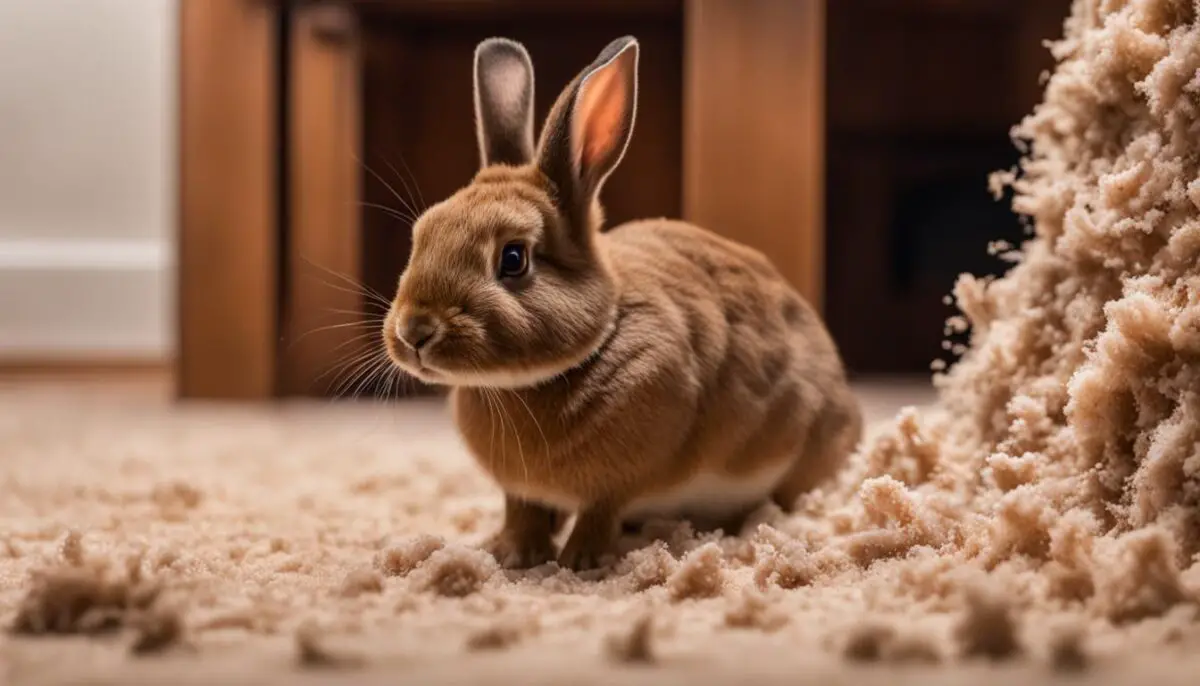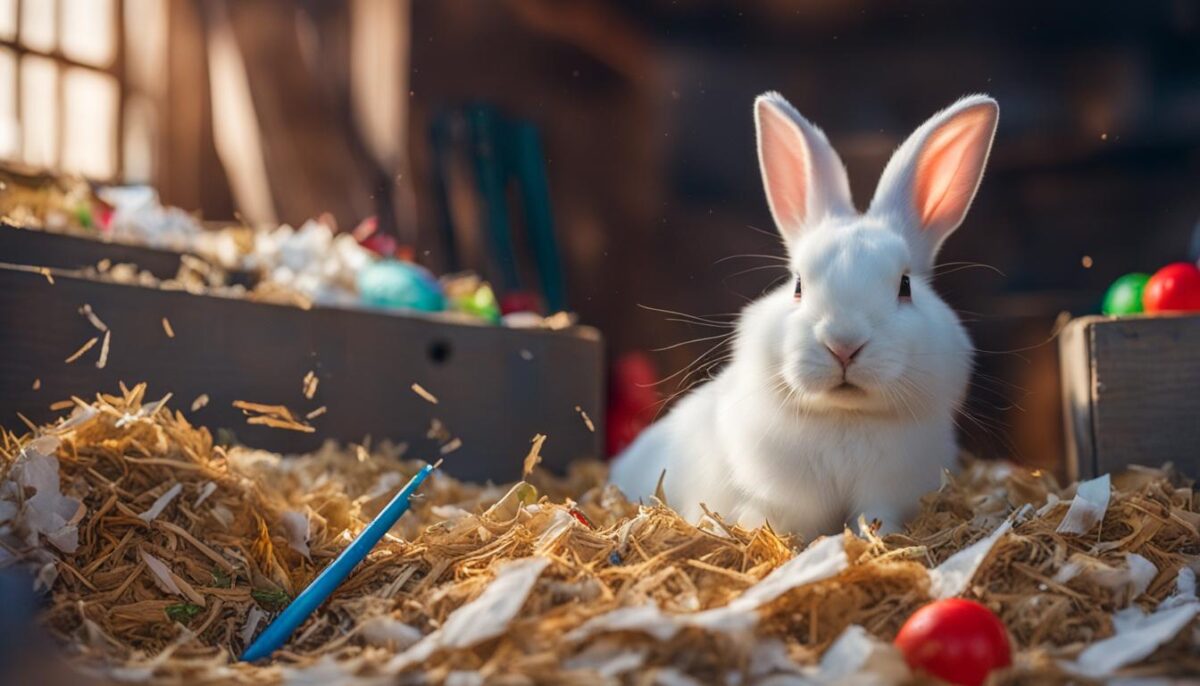Rabbits are known for their adorable appearance and fluffy tails, but did you know that they also have a natural instinct to dig? If you’ve ever wondered why rabbits dig holes, you’re not alone. In this article, we will delve into the fascinating world of rabbit digging behavior and explore the reasons behind this intriguing habit.
Rabbit digging behavior serves several purposes. From constructing burrows to finding food and seeking cool earth to rest on, digging is an instinctive behavior that meets their welfare needs. It also promotes muscle health and allows them to escape from predators when necessary.
If you’re a proud rabbit owner, providing appropriate outlets for digging is essential for your furry friend’s well-being. By understanding the reasons behind their digging behavior, you can ensure they live a happy and fulfilling life while coexisting peacefully in your home.
Key Takeaways:
- Rabbits dig holes for various reasons, including constructing burrows and finding food.
- Digging is a natural instinct that promotes muscle health and helps them escape from predators.
- Providing appropriate outlets for digging is crucial for a rabbit’s well-being.
- Understanding the reasons behind rabbit digging can help redirect their behavior into more constructive outlets.
- By offering enrichment options, we can ensure rabbits live happy and fulfilling lives.
Why Rabbits Dig Holes
The Natural Behavior of Rabbits: Digging and Burrowing
In the wild, rabbits exhibit natural behaviors that include digging and burrowing. These instincts serve various purposes and are essential for their survival and overall well-being. Understanding the reasons behind rabbit digging can help us provide appropriate outlets and ensure their needs are met.
Rabbits have a strong burrowing instinct. They create elaborate burrows known as warrens, which serve as safe spaces for sleeping, giving birth to their offspring, and finding protection from predators. Female rabbits are typically responsible for constructing these complex burrows, while males create scrapes for marking and resting. Burrowing is a crucial behavior for rabbits in the wild, enabling them to ensure their safety and maintain their territories.how long rabbits stay in nest
Domestic rabbits also retain their innate digging instincts. Many pet rabbits enjoy digging as a source of mental stimulation and fun. Providing them with suitable alternatives for digging, such as digging boxes or containers filled with soil, wood shavings, or sand, can satisfy their natural needs while preventing them from causing damage to other areas of the house.
| Reasons for Rabbit Digging | Benefits |
|---|---|
| To construct burrows | Provides a safe space for sleeping and giving birth |
| To uncover food | Allows access to hidden sources of nutrition |
| To find cool earth to rest on | Regulates body temperature, especially during hot weather |
| To escape from predators | Provides a means of evasion and protection |
| To seek attention | Expresses a social and interactive need |
Rabbit digging is a natural behavior rooted in their instincts. By understanding and accommodating these behaviors, we ensure that rabbits can lead fulfilling lives, both in the wild and as beloved pets in our homes.
The Role of Territory: Why Rabbits Dig in Specific Areas
When rabbits dig holes, they often establish territories that they oversee and protect. These territories are usually in close proximity to their burrows, allowing quick access to shelter in case of danger. Rabbits maintain a designated turf and do not venture far for food, preferring to stay within their territory. They may form warrens with other rabbits, and the males have the responsibility of protecting these communal burrows. duration of rabbits in nest
In their territories, rabbits engage in territorial behaviors, such as marking their boundaries and defending against intruders. They use scent glands located on their chins and cheeks to leave scent markings, signaling ownership and warning other rabbits to stay away. These territorial behaviors help establish a sense of security and ensure that rabbits have access to essential resources like food, water, and shelter.
The Benefits of Rabbit Territory
Rabbit territories serve several important functions. Firstly, they provide a safe haven for rabbits to retreat to when they feel threatened or vulnerable. The proximity of the territory to their burrows ensures that they can quickly seek shelter, minimizing their exposure to potential dangers. Secondly, territorial behavior helps regulate the rabbit population by reducing conflicts between individuals. Rabbits are known to be territorial animals, and establishing defined boundaries reduces the chances of aggressive encounters and fights among them.time rabbits spend in nests
Furthermore, having a designated territory allows rabbits to conserve energy by staying within a familiar area that meets their needs. They become familiar with the location of food sources, water, and safe areas for resting, eliminating the need to search for these essentials. This conserves their energy for activities like reproduction, maintaining their burrows, and ensuring the safety of their territory.

In conclusion, the role of territory is a significant factor in why rabbits dig in specific areas. It provides them with a sense of security, enables resource management, and facilitates social interactions within their communities. Understanding the importance of rabbit territories allows us to appreciate the instinctual behavior of digging and its role in rabbit welfare.
Digging Habits in Domestic Rabbits: Bringing Their Wild Instincts Indoors
Domestic rabbits, despite living in the comfort of our homes, still retain their innate digging instincts. It is not uncommon to see pet rabbits engaging in digging behaviors as they attempt to satisfy their natural needs for mental stimulation and physical activity. Understanding and addressing these digging habits is crucial to ensure their well-being and prevent any damage to our homes.length of stay for rabbits in nests
To redirect the digging behavior of domestic rabbits, providing appropriate outlets for their natural instincts is essential. One effective way to do this is by creating a digging box or designated area where they can freely indulge in their favorite pastime. This can be filled with soil, wood shavings, or sand to mimic the sensation of digging in the wild. By offering this alternative, rabbits can focus their energy and attention on the designated area, reducing the likelihood of destructive digging elsewhere in the house.
Another method to redirect digging habits in pet rabbits is by incorporating enrichment activities into their daily routine. Engaging toys, such as treat puzzles or interactive games, can help stimulate their minds and provide a constructive outlet for their energy. Additionally, regularly rotating and introducing new toys can prevent boredom and further discourage them from engaging in destructive digging behaviors.
| Step | Action |
|---|---|
| 1 | Create a digging box or designated area filled with soil, wood shavings, or sand. |
| 2 | Provide engaging toys and enrichment activities to stimulate their minds. |
| 3 | Regularly rotate and introduce new toys to prevent boredom. |
It is important to note that spaying or neutering your pet rabbit can also play a role in reducing digging tendencies. Unaltered rabbits may exhibit more territorial behaviors, including excessive digging, in an attempt to mark their territory. Spaying or neutering can help calm their instincts and make them less prone to engage in destructive digging.rabbit nest stay duration
By understanding and catering to the digging habits of domestic rabbits, we can provide them with a fulfilling and enriched environment while preserving the integrity of our homes. Redirecting their digging behavior through designated areas, enrichment activities, and spaying or neutering can ensure that our rabbit companions live happy and fulfilling lives.
Understanding the Reasons behind Rabbit Digging: Boredom, Stress, and Attention-Seeking
Rabbits are intelligent and curious animals that rely on mental stimulation and physical activity to thrive. When they experience boredom or stress, they may resort to digging as a way to cope with these emotions. Rabbit digging boredom can arise when they have limited opportunities for play and exploration. Providing them with engaging toys, tunnels, and puzzles can help alleviate their boredom and reduce their need to dig excessively.
Stress can also trigger digging behavior in rabbits. Changes in their environment, such as the introduction of a new pet or loud noises, can cause anxiety and prompt them to dig as a way of seeking comfort. Creating a calm and secure living space for your rabbit can help minimize their stress levels and prevent excessive digging. Implementing a consistent daily routine and offering them a safe retreat area can go a long way in reducing stress-related digging behavior. rabbit nesting period
Rabbit digging can also be a form of attention-seeking. Some rabbits learn that by digging in specific areas, they can elicit a response from their owners. If a rabbit receives attention or treats when they dig, they may continue this behavior as a way to seek interaction. It’s important to redirect their attention-seeking behavior towards more constructive outlets, such as interactive toys or spending quality time together.
Boredom, stress, and attention-seeking through digging can all contribute to a rabbit’s behavior. By understanding these underlying reasons, rabbit owners can better address their needs and provide appropriate alternatives to destructive digging. Engaging with your rabbit through play, offering environmental enrichment, and ensuring a stress-free environment can help keep their digging behavior in check.
Table: Tips to Manage Rabbit Digging Behavior
| Tip | Description |
|---|---|
| Provide Enrichment | Offer a variety of toys, tunnels, and puzzle feeders to keep rabbits mentally stimulated and prevent boredom. |
| Create Digging Options | Set up designated digging areas or provide digging boxes with appropriate substrates, such as sand or shredded paper. |
| Redirect Attention | Engage in interactive play sessions and provide attention and treats for alternative behaviors, such as playing with toys or performing tricks. |
| Establish a Routine | Stick to a consistent schedule for meals, exercise, and playtime to provide a sense of security and stability for your rabbit. |
| Address Stressors | Identify and minimize external stressors, such as loud noises or disruptive pets, that may contribute to your rabbit’s digging behavior. |
| Spay or Neuter | Consider spaying or neutering your rabbit, as this can help reduce hormone-driven behaviors, including excessive digging. |
Digging on People: Communication and Begging for Attention
Rabbits have a unique way of communicating with their humans – through digging. This behavior is often a form of attention-seeking or conveying specific messages. By understanding their digging habits, you can decipher their intentions and respond accordingly.how long do baby rabbits stay in nest
When a rabbit digs on a person’s leg, it may be a way of requesting attention or expressing impatience. The rabbit is trying to engage with you and communicate its desire for interaction. Similarly, if a rabbit starts digging on your chest while being held, it may be signaling a plea to be released. By paying attention to their body language and cues, you can better understand their needs and provide the appropriate response.
“Understanding the context and cues of a rabbit’s digging behavior towards humans can help decipher their intentions and respond accordingly.”
It’s important to note that digging on people is not aggressive behavior but rather a way for rabbits to communicate their desires. By reciprocating their communication efforts, you can build a stronger bond and fulfill their need for attention.

Summary:
- Rabbits communicate with humans through digging behavior.
- Digging on a person’s leg may indicate a request for attention or impatience.
- Digging on the chest while being held can be a plea to be released.
- Understanding their digging habits helps strengthen the human-rabbit bond.
Protecting Your Carpet from Rabbit Digging: Strategies and Tips
Rabbits are naturally inclined to dig, and their instinctual behavior can pose a challenge when it comes to protecting your carpets. However, there are several strategies and tips you can implement to prevent carpet damage caused by rabbit digging and rabbit-proof your home. nest tenure of rabbits
Creating a Rabbit-Friendly Environment
One approach to safeguarding your carpets is to set up your rabbit’s enclosure in a room without carpeting. This can help minimize the risk of damage and make cleaning easier. If you prefer to have your rabbit in a carpeted area, consider covering specific areas prone to digging with mats, plastic sheets, or even cardboard. These barriers can act as deterrents and protect your carpets.
Redirecting their Digging Behavior
Providing alternative options for your rabbit to satisfy their digging instincts can go a long way in preventing damage to your carpets. Create a designated digging area by setting up a digging box filled with soil, wood shavings, or sand. This will give your rabbit an appropriate outlet for their digging behavior and help redirect their attention away from your carpets.rabbit nest stay time
Spaying or Neutering your Rabbit
Consider having your rabbit spayed or neutered, as this can help reduce their digging tendencies. Spaying or neutering can help regulate hormone levels, leading to less destructive behavior, including digging. Consult with a veterinarian to determine the best time for this procedure and ensure the overall well-being of your rabbit.
| Digging Prevention Strategies | Effectiveness | Cost |
|---|---|---|
| Setting up enclosure in a non-carpeted room | High | Low |
| Using mats, plastic sheets, or cardboard to cover specific areas | Moderate | Low |
| Providing a designated digging box | High | Low |
| Having your rabbit spayed or neutered | High | Varies |
Implementing these strategies and tips can help protect your carpets from rabbit digging and ensure a harmonious living environment for both you and your furry friend.

Dealing with Litter Box Digging: Enrichment and Distraction
While litter box digging can be a frustrating behavior for rabbit owners, there are several strategies you can employ to address this issue. By providing enrichment and offering distractions, you can help redirect your rabbit’s natural digging instincts.
One effective method is to ensure that your rabbit’s enclosure is spacious enough to accommodate their need for exercise and exploration. A larger living area can help alleviate boredom and prevent your rabbit from seeking alternative activities, such as digging in their litter box. Additionally, consider providing a variety of toys and objects for your rabbit to interact with, such as digging boxes, cat scratcher mats, or old t-shirts, which can engage their natural instincts and keep them entertained.average stay of rabbits in nests
Remember to always supervise your rabbit during playtime and remove any items that may present a choking hazard or potential danger.
Spaying or neutering your rabbit can also be beneficial in reducing destructive behaviors, including litter box digging. This procedure has been known to calm rabbits and minimize their instinctual need to mark their territory through digging. Consult with your veterinarian to determine the appropriate age and timing for this procedure.
| Strategies for Dealing with Litter Box Digging | Benefits |
|---|---|
| Provide a spacious enclosure | Allows for exercise and exploration |
| Offer a variety of toys and objects | Engages natural instincts and provides entertainment |
| Spay or neuter your rabbit | Reduces destructive behaviors and territorial marking |
By implementing these strategies and offering your rabbit appropriate enrichment options, you can help prevent litter box destruction and promote a happy and healthy environment for your furry companion.

Conclusion
Rabbits have a natural instinct to dig, and it is an essential behavior for their physical and mental well-being. Understanding the reasons behind rabbit digging and providing appropriate outlets can allow them to express their natural behaviors without causing destruction. By redirecting their digging tendencies and offering enrichment options, we can ensure that rabbits live happy and fulfilling lives while coexisting peacefully in our homes.
Creating a safe and stimulating environment for rabbits is key to satisfying their digging needs. Providing digging boxes or containers with soil, wood shavings, or sand can offer them a designated area for their digging instincts. This not only prevents them from damaging carpets or other areas of the house, but also keeps them mentally engaged and physically active.
It is important to remember that rabbits may dig for various reasons, such as boredom, stress, or the desire for attention. Identifying the underlying factors behind their digging behavior can help us address their specific needs. Ensuring rabbits have plenty of toys, social interaction, and mental stimulation can help alleviate boredom and reduce destructive digging habits.
By understanding and respecting rabbits’ natural instincts, we can create a harmonious living environment for both humans and rabbits. With the right resources and enrichment options, we can allow these adorable creatures to embrace their natural behaviors while keeping our homes intact. Let’s provide them with the outlets they need to dig, explore, and thrive.
FAQ
Why do rabbits dig holes?
Rabbits dig holes for various reasons, including constructing burrows, uncovering food, finding cool earth to rest on, escaping from predators, and seeking attention.
What is the natural behavior of rabbits when it comes to digging and burrowing?
In the wild, rabbits live in burrows known as warrens. Digging is an instinctual behavior for them to create safe spaces for sleeping, giving birth, and finding protection from predators. Female rabbits typically construct large burrows, while males make scrapes for marking and resting.
Why do rabbits dig in specific areas?
When rabbits dig holes, they often establish territories that they oversee and protect. These territories are usually in close proximity to their burrows, allowing quick access to shelter in case of danger. Rabbits maintain a designated turf and do not venture far for food, preferring to stay within their territory.
How can I redirect my pet rabbit’s digging behavior indoors?
Domestic rabbits retain their innate digging instincts, and many enjoy digging for fun and mental stimulation. Providing appropriate outlets for their digging behaviors, such as digging boxes or containers with soil, wood shavings, or sand, can help satisfy their natural needs. These digging units can keep them occupied and prevent them from destroying other areas of the house, like carpets or gardens.
What are the underlying reasons behind rabbit digging, such as boredom or stress?
Rabbits may dig as a way to cope with boredom or alleviate stress. Destructive digging behavior often occurs when they are feeling confined, lack mental stimulation, or are experiencing frustration. Understanding these underlying reasons can help redirect their digging behavior into more constructive outlets.
Why do rabbits dig on people?
Rabbits may dig onto people as a form of communication. They learn that digging behaviors can get attention or convey specific messages. Understanding the context and cues of a rabbit’s digging behavior towards humans can help decipher their intentions and respond accordingly.
How can I protect my carpet from rabbit digging?
One approach is to set up the rabbit’s enclosure in a room without carpet or cover specific areas prone to digging with mats, plastic mats, or cardboard. Providing alternative options, such as a digging box or crumpled paper, can redirect their digging behavior. Spaying or neutering rabbits can also help reduce their digging tendencies.
How can I deal with litter box digging?
Some rabbits may develop a habit of digging in their litter box out of boredom or lack of mental stimulation. Providing a spacious enclosure, a variety of toys, and daily attention can prevent litter box digging. Toys like digging boxes, cat scratcher mats, or old t-shirts can engage rabbits and keep them entertained. Spaying or neutering can also help reduce destructive behaviors, including litter box digging.


